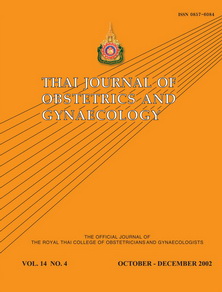Impact of Residual Tumor on Survival of Patients with Advanced Stage Common Epithelial Ovarian Cancer at King Chulalongkorn Memorial Hospital from 1995 to 1999
Main Article Content
Abstract
Objective To evaluate the influence of residual tumor on survival of patients with advanced
stage common epithelial ovarian cancer. Prognostic factors on survival and progression free
period in patients with advanced stage common epithelial ovarian cancer were determined as
secondary objective.
Study design Retrospective analytical study.
Setting Gynecologic Oncology Unit, Department of Obstetrics and Gynecology, King
Chulalongkorn Memorial Hospital.
Methods A retrospective review of 110 medical records of patients with advanced stage
common epithelial ovarian cancer being treated at King Chulalongkorn Memorial Hospital from
1995 to 1999. Data were reviewed to determine variables having significant correlation with
survival time and progression free period. Survival time was analysed using Kaplan-Meier
survival curves. Prognostic variables were analyzed using the Log rank and Cox regression
analysis.
Results One hundred and ten patients were included in this study with age ranging from 27 to
76 years. Survival time could be evaluated in 102 patients ranging from 3 to 88 months with a
median of 19 months. Progression free period could be evaluated in 93 patients ranging from 0
to 70 months with a median of 10.5 months. Cox regression analysis revealed that histology of
the tumor and compliance to chemotherapeutic protocol influenced both survival time and
progression free period (p<0.05) while size of residual tumor following primary cytoreduction
influenced only progression free period (p<0.05).
Conclusion Residual tumor size following primary cytoreductive surgery does not influence
patient survival but influences progression free period. Histology of the tumor and compliance
to chemotherapeutic protocol appear to be important determinants of both survival time and
progression free period in patients with advanced stage common epithelial ovarian cancer.
stage common epithelial ovarian cancer. Prognostic factors on survival and progression free
period in patients with advanced stage common epithelial ovarian cancer were determined as
secondary objective.
Study design Retrospective analytical study.
Setting Gynecologic Oncology Unit, Department of Obstetrics and Gynecology, King
Chulalongkorn Memorial Hospital.
Methods A retrospective review of 110 medical records of patients with advanced stage
common epithelial ovarian cancer being treated at King Chulalongkorn Memorial Hospital from
1995 to 1999. Data were reviewed to determine variables having significant correlation with
survival time and progression free period. Survival time was analysed using Kaplan-Meier
survival curves. Prognostic variables were analyzed using the Log rank and Cox regression
analysis.
Results One hundred and ten patients were included in this study with age ranging from 27 to
76 years. Survival time could be evaluated in 102 patients ranging from 3 to 88 months with a
median of 19 months. Progression free period could be evaluated in 93 patients ranging from 0
to 70 months with a median of 10.5 months. Cox regression analysis revealed that histology of
the tumor and compliance to chemotherapeutic protocol influenced both survival time and
progression free period (p<0.05) while size of residual tumor following primary cytoreduction
influenced only progression free period (p<0.05).
Conclusion Residual tumor size following primary cytoreductive surgery does not influence
patient survival but influences progression free period. Histology of the tumor and compliance
to chemotherapeutic protocol appear to be important determinants of both survival time and
progression free period in patients with advanced stage common epithelial ovarian cancer.
Article Details
How to Cite
(1)
Manipalviratn, S.; Worasethsin, P.; Triratanachat, S.; Tresukosol, D. Impact of Residual Tumor on Survival of Patients with Advanced Stage Common Epithelial Ovarian Cancer at King Chulalongkorn Memorial Hospital from 1995 to 1999. Thai J Obstet Gynaecol 2017, 14, 269.
Section
Original Article


